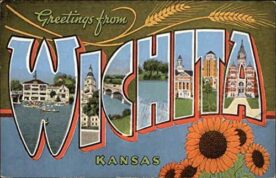 Wichita became the latest and most significant municipality in Kansas to approve a charter ordinance anointing the city’s website as its “official newspaper.” But the new ordinance came with a twist: It included a provision calling for the city to also publish its notices in a “secondary print source.”
Wichita became the latest and most significant municipality in Kansas to approve a charter ordinance anointing the city’s website as its “official newspaper.” But the new ordinance came with a twist: It included a provision calling for the city to also publish its notices in a “secondary print source.”
Wichita is at least the fifth municipality in Kansas to replace its official newspaper with the city website despite a state law requiring notices to be published in a local paper. Attorney General Kris Kobach gave them the green light when he issued a legal opinion last year declaring that home-rule provisions in the state’s constitution “allows cities to exempt themselves from nonuniform acts of the Legislature.” (As the last sentence in the opinion notes, website notice isn’t sufficient when a particular type of notice is specifically mandated by statute, e.g., budget notices, treasurer’s reports, etc.)
The Wichita Eagle columnist Dion Lefler had expected Wichita’s city council to approve the charter ordinance making the city’s website its primary source of public notice. (The Eagle had been Wichita’s official newspaper before the vote.) But he was surprised when council member Becky Tuttle proposed an amendment to the ordinance calling for Kansas’s most populous city to also publish its notices in print. The ordinance with Tuttle’s language passed by a vote of 5-2 during the council’s June 18 meeting.
“I’ve said consistently since the first time this item was brought to us that I’m not willing to sacrifice transparency for cost-savings,” Tuttle said, according to the Eagle’s report of the meeting. “I understand that we have looming budget shortfalls in ‘26, ‘27, ‘28, but I also think it is our responsibility to be transparent.
Unfortunately, the impact of Tuttle’s amendment remains unclear because the language of the charter ordinance isn’t yet publicly available. (Links on Wichita’s website purportedly leading to a copy of the ordinance are dead.) So it’s still unknown whether Tuttle’s language is mandatory or elective, or which kinds of “print sources” will qualify to publish the notices.
According to Kansas Press Association (KPA) Executive Director Emily Bradbury, it’s also unclear whether the ordinance will save the city money even though it was originally pitched as a cost-saving measure. That’s because fee limits set by state law will no longer apply when the city selects its secondary print source.
The vote on the charter amendment was delayed in part because government meetings in Wichita were canceled in May after the city website was crippled by a ransomware attack. Tuttle argued the website’s vulnerability was one of the reasons notices shouldn’t be published there exclusively. (Wichita’s ransomware attack was merely the latest in a string of cybersecurity incidents that have devastated government websites in Kansas, including the state’s court system, the Kansas City Area Transportation Authority and Kansas State University.)
After the Attorney General gave a thumbs up to municipalities’ desire to designate their city websites as official newspapers, KPA urged its members to meet the threat by working to bring the issue before local voters in a special election. Ark Valley News Publisher Chris Strunk followed KPA’s playbook and succeeded in getting a petition approved that forced the City of Bel Aire to rescind its ordinance moving its notices from his weekly paper to the city website. The city’s other option would have been to put the matter up to a vote.
Nevertheless, Bel Aire’s city council didn’t give up. In May, the council approved a new charter ordinance allowing it to “designate from time to time by resolution a newspaper or the City website … or both as the official newspaper.” They also elected to submit the ordinance to a referendum. The election is scheduled Aug. 6, the same day Kansas voters go to the polls for their party primaries.
“They did it with a little more nuance this time,” Strunk says about the new ordinance. “But essentially they’re still trying to bypass independent, third-party notice by taking newspapers out of the loop.” Strunk is confident local voters will reject the ordinance.
Kansas isn’t the only state where local governments have taken moves to rewrite their own public notice laws. However, most states don’t have a charter ordinance form of government so those kinds of changes usually need to be authorized by state legislatures.
Massachusetts has seen the most such activity, with at least 11 bills introduced so far in the 2023-24 session seeking to change local public notice responsibilities. Five of those bills were reported out of committee last week. They would allow various towns in the state — including Lexington, famous for a revolution-period public notice story about a guy delivering notice via horseback — to select other options aside from newspaper notice, including notice via newspaper website or government website.
Other states where local notice bills have been introduced in the current legislative session include Delaware, Florida, Maryland, Minnesota, North Carolina, New York and Rhode Island. Five of those bills have passed, including measures in Delaware, Maryland and Minnesota requiring new newspaper notices in special circumstances.
Another local notice controversy we wrote about last year came to an end when the Casper Star-Tribune dropped its lawsuit seeking to prevent the Wyoming municipalities of Mills and Bar Nunn from circumventing state law newspaper-notice requirements. The Star-Tribune abandoned the suit after both cities adopted new ordinances replacing the local laws the suit was based on, apparently mooting the issues being contested in the case.
Like Kansas, Wyoming is one of the three states that grant home-rule powers to municipalities via a charter ordinance form of government, according to Ballotpedia.
